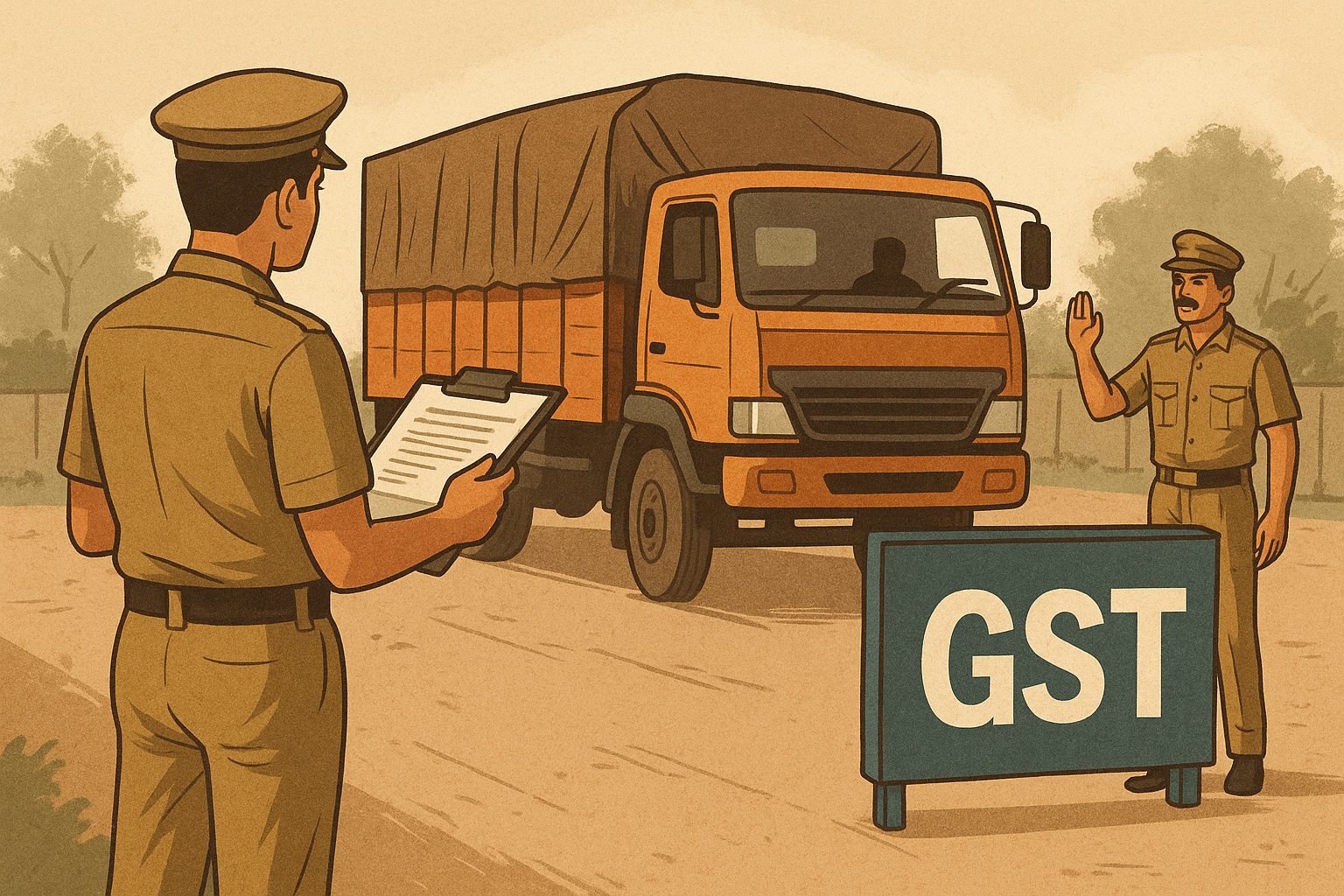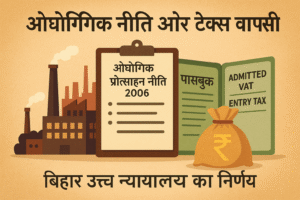Simplified Explanation of the Judgment
This Patna High Court judgment addresses a common problem seen under the Goods and Services Tax (GST) regime: delayed orders in detention proceedings under Section 129 of the Central Goods and Services Tax Act, 2017 (CGST Act). The case arose from the detention of a vehicle transporting goods. The competent authority issued a notice under Section 129(3) but failed to pass the final order within seven days from the service of that notice. The High Court held that this statutory timeline is mandatory. Because the authority crossed the seven-day limit, the final order imposing penalty was quashed, and a refund of the amount paid was directed.
Here is the factual timeline in plain terms:
• The vehicle carrying the goods was detained on 30.03.2024. Physical verification was also done that same day.
• A notice (GST MOV-07) was uploaded on the portal on 04.04.2024. The notice bore the signature of the dealer’s representative, so service of notice was treated as completed within seven days of the detention.
• The notice gave time to reply up to 11.04.2024. Since 11.04.2024 was a public holiday, the reply was filed on 12.04.2024.
• The authority passed the penalty order on 18.04.2024—six days after the reply date and beyond the seven-day limit reckoned from service of notice.
Section 129(3) of the CGST Act requires two things: (i) that a notice be served specifying tax and penalty, and (ii) that the order must be passed within seven days from the date of service of the notice. The Court found that while the notice itself was on time, the final order missed the statutory window. The department argued that since the reply was filed on 12.04.2024 (because 11.04.2024 was a holiday), the seven-day clock should be counted from 12.04.2024. The Court rejected this approach. The statute ties the seven-day period to “service of notice,” not to the date of reply. In other words, the law does not allow the authority to extend the deadline merely by granting more time to reply or by waiting for the reply. The order must still be passed within seven days from service, after considering whatever reply is on record by that date.
The petitioner also relied on an internal circular (issued under Section 68 read with Rule 138) that reinforces the statutory scheme: the detention order (GST MOV-06) and the show cause notice (GST MOV-07) must strictly follow Section 129(3). The Court agreed that the circular supports the legislative intent—swift determination within seven days so that goods and vehicles are not kept under detention indefinitely. Here, the authority gave the “entire limitation period” for filing the reply and then passed the order only on 18.04.2024. That, the Court said, defeats the mandate of Section 129(3).
The State also argued that since the taxpayer later made payment on 24.04.2024, sub-section (5) of Section 129 applied (which deals with release of goods/vehicle upon payment). The Court was not persuaded. By 24.04.2024 a penalty order had already been passed on 18.04.2024. The assessee’s position was that the payment was made only to secure release of the vehicle under protest (and not as a voluntary acceptance under Section 129(1)(a)). Given that the foundational order itself was time-barred, the subsequent payment could not cure the illegality.
In the end, the High Court set aside the impugned order for violation of the seven-day requirement under Section 129(3) and ordered refund of the amount deposited. This outcome underlines a key compliance message for both taxpayers and the department: the seven-day clock is real and mandatory, and any order passed beyond it is vulnerable to being struck down.
Significance or Implication of the Judgment (For general public or government)
For businesses and transporters, this decision is a strong safeguard against prolonged detentions and delayed penalty orders under GST. It clarifies that the seven-day period under Section 129(3) is not a flexible guideline—it is a binding timeline. If authorities delay beyond seven days after service of the notice, the order risks being invalid.
For the government and the tax department, the ruling is a reminder to strictly adhere to statutory timelines and to structure internal workflows accordingly. Officers must plan issuance of notices, grant of reply time, and final decision-making so that the order is released within seven days from service of the notice—even when a holiday intervenes. If a reply is not filed in time, the authority must still proceed on available material, record reasons, and meet the deadline. This ensures quick resolution, prevents unnecessary detention of vehicles/goods, reduces litigation, and promotes voluntary compliance by maintaining confidence in fair and timely administration.
Legal Issue(s) Decided and the Court’s Decision with reasoning
• Whether the authority can pass a Section 129(3) penalty order beyond seven days from service of notice by counting the period from the reply date rather than from service of the notice.
— Decision: No. The seven-day limit runs from the date of service of the notice, not from the date of reply. The impugned order passed on 18.04.2024 exceeded the statutory timeline and is unsustainable. The Court set it aside.
• Whether a subsequent payment to secure release of the vehicle validates or cures an otherwise time-barred order.
— Decision: No. Payment on 24.04.2024 could not validate the already-passed (and time-barred) order of 18.04.2024. The Court directed refund of the amounts paid.
• Applicability of departmental circular issued under Section 68 read with Rule 138 to reinforce compliance with Section 129(3).
— Decision: The circular supports strict adherence to Section 129(3). Granting the entire limitation to file reply and then missing the order-passing deadline defeats the statutory mandate.
Judgments Referred by Parties
• Petitioner: Relied on Division Bench judgment in C.W.J.C. No. 7985 of 2024 (Pawan Carrying Corporation vs Commissioner CGST & Central Excise & Ors.), where delay beyond the statutory limit was held fatal.
• State/Respondents: Relied on CWJC No. 4924 of 2023 (M/s Sangam Wires vs State of Bihar & Ors.), but the Court found it inapplicable since that case dealt with an order passed on the same day as notice, raising natural justice concerns rather than limitation.
Judgments Relied Upon or Cited by Court
• The Court discussed and distinguished M/s Sangam Wires (CWJC No. 4924 of 2023) and found Pawan Carrying Corporation (C.W.J.C. No. 7985 of 2024) relevant on the aspect of delay in passing orders under Section 129(3).
Case Title
M/s Kedia Enterprises v. State of Bihar & Anr. (Patna High Court)
Case Number
Civil Writ Jurisdiction Case No. 11021 of 2024
Coram and Names of Judges
Hon’ble The Chief Justice K. Vinod Chandran and Hon’ble Mr. Justice Partha Sarthy
Names of Advocates and who they appeared for
• For the petitioner: Mr. Anubhav Khowala, Advocate
• For the respondents (State): Mr. Vikash Kumar, SC-11
Link to Judgment
MTUjMTEwMjEjMjAyNCMxI04=-Y8QKeOiRImU=
If you found this explanation helpful and wish to stay informed about how legal developments may affect your rights in Bihar, you may consider following Samvida Law Associates for more updates.








